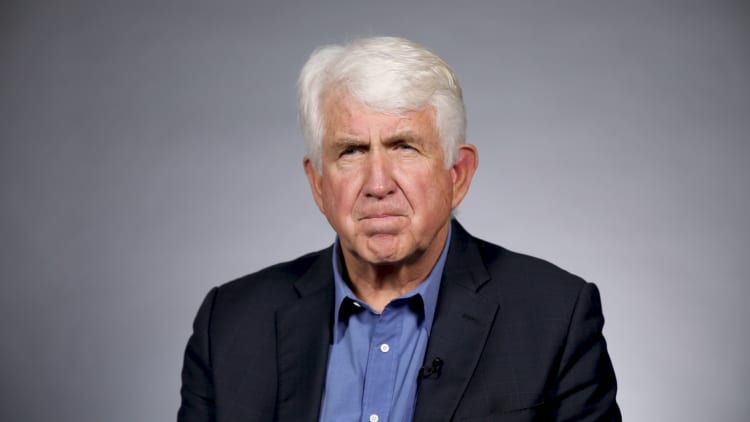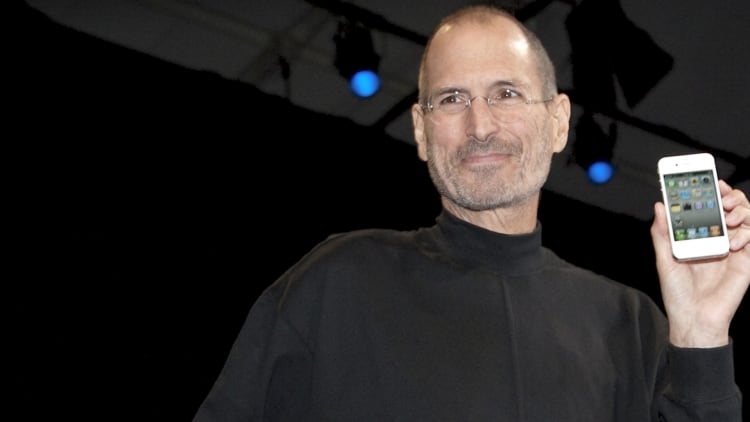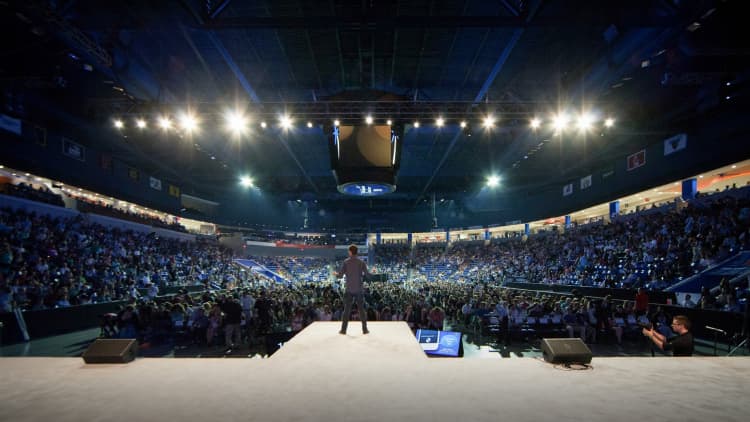John Sculley and Apple co-founder Steve Jobs got together every weekend for five months as Jobs was trying to convince Sculley to take a job at Apple. Sculley, who was the CEO of Pepsi at the time, first met Jobs after Thanksgiving in 1982.
"We got to know each other very, very well, but at the end of it I said, 'Steve, I've thought about it and I'm not coming to Apple,'" Sculley, now 79, tells CNBC Make It. This was the last Sunday in March, 1983.
"Steve paused and thought for a while, and then he was about 18 inches away from me — and in those days he was in his 20s and he had jet black hair, very dark eyes and he was right in my face — and he said, 'You want to sell sugar water for the rest of your life, or do you want to come with me and change the world?'"
On April 11, 1983, Sculley joined Apple as the CEO. And from 1983 to 1993, he was the CEO. In that time, Apple went from having revenues of $569 million to $8.3 billion, Sculley tells CNBC Make It.
One of Jobs' talents was convincing talented people to work with him. "Steve had that ability to put into words exactly a message that would resonate with the people he was trying to recruit," Sculley says.
Indeed, it worked for Sculley. In the years Sculley and Jobs worked together at Apple (Jobs resigned in 1985 before returning to the company again in 1997), Sculley learned numerous lessons from the iconic inventor and entrepreneur.
'Insatiable curiosity'
"I would say the most important lesson I learned was the incredible combination of an insatiable curiosity combined with an obsessive desire to change the world, and how much impact that kind of leadership could have on not just the company but on society in general," says Sculley.
"Steve's passion was to 'put a dent in the universe.' Those were his words. And he was willing to do whatever it took. He was willing to set his personal life aside, he was willing to be incredibly demanding to people who worked with him," says Sculley.
Jobs didn't compromise, a trait which was in equal measures what lead to his legacy and what made him hard to work with.
"On the one hand, it led to the design principles that you see with iPhones today, you know where there are no compromises on the good finish design or on the user experience or the software. On the other hand, the work environment working with Steve was not the easiest at times because he was extremely tough to make sure that there were never any compromises," Sculley says.
For example, days before the first release of the Macintosh motherboard, a manufacturing engineer brought the motherboard to Jobs for final approval. Jobs did not like the way a wire looked on the motherboard. The case for the computer was designed so that it was very difficult to get into the computer box. The engineer's response was, "Nobody will ever know," recounts Sculley. "I'll know. No compromises, go back and re layout this motherboard," Jobs says, according to Sculley.
'Noble cause'
While working with Jobs wasn't always easy, it was also inspiring, says Sculley, who remembers being privy to a conversation between the legendary Apple co-founder and Microsoft co-founder Bill Gates.
"I would say that one of the things that made a huge impression on me was I had been at Apple for about three months and I was sitting around one evening in the Macintosh engineering laboratory with Steve Jobs and Bill Gates. And Steve Jobs and Bill Gates were talking about their 'noble cause,'" Sculley says. "I had never heard the words 'noble cause' in business in my entire life."
For Jobs and Gates, bringing computing power to individuals was more than a business model and a way to make money.
"As I listen to them, they said, 'We're creating,' — Steve and Bill — 'an entirely new industry that never existed before.' I'd never worked on trying to create a new industry before. I had always worked in the soft drink industry where it was Coke versus Pepsi, it was called the Cola Wars," remembers Sculley.
"And so as I listened to them and they said, 'Yeah, we're going to empower individuals with tools for the mind. It's going to be done on something we call a personal computer, it's going to be more about software than hardware and we're going to change the world one person at a time.'
"And it was so different than anything I'd ever heard about a business before, coming from a highly competitive industry — someone wins someone loses — to now where two geniuses were saying they're going to create an entirely new industry, they were going to change the world.

"That kind of missionary capability stuck with me," says Sculley.
Today, Sculley says his position as the chief marketing officer at the health care technology company RxAdvance is inspired by his desire to pursue noble causes in business. Massachusetts-headquartered RxAdvance, started in 2013, built a cloud based platform for prescription insurance processing. It makes money by contracting with health insurance companies, explains Sculley.
"In the healthcare industry, you have to be motivated to to take on really hard problems. This isn't about taking on easy problems and saying how much money can we make solving an easy problem, this is about taking on some of the hardest problems and saying how do we go into an industry that has not up until now shown much in disruptive innovation," says Sculley.
He says RxAdvance is working to bring down the cost of healthcare in the United States by bringing down the costs related to managing prescription drug costs in particular.
'Zooming'
In order to be innovative, Jobs implemented a strategy of consciously changing his perspective with a process called "zooming," says Sculley.
Real disruption "takes place on the edge of where one industry is colliding with another industry and [Jobs] said therefore you've got to zoom out," Sculley explains.

Jobs brought together what were, at the time, seemingly unrelated industries, says Sculley.
"Steve connected those dots between calligraphy, laser printing and computers that could to be cheap enough and easy enough to use for non-technical people, and so that was the vision — that was the zooming out," says Sculley. This vision Jobs had lead to what would be desktop publishing on the Macintosh computer, says Sculley.
Also important to Jobs was the process of zooming in, according Sculley. Zooming in is the process of finding elegant, intuitive solutions to these newly identified industries.
"Steve would say that simplification is the ultimate sophistication, meaning that once you know how the dots connect, even if it cuts across industries that previously had never had a connection with one another, then you have to simplify it and make the solution so simple that even non-technical people will be able to use your tools and will be able to be motivated to do amazing things with them," says Sculley.
For example, when Apple was developing desktop publishing, Jobs rejected a section of code for the "point-and-click" capability from an engineer who had been up for almost 24 hours working because it wasn't simple enough.
"He said, 'Steve, I have got it down to five steps, let me show you.' Steve replied, 'I won't look at it until you get it down to three steps.' He sent the engineer away without looking at the demo," Sculley says.
"And that was his great skill, zooming out and zooming in," says Sculley.
That very lesson, Sculley says he applied to his recent work at RxAdvance. "That's one example of things I learned from Steve," says Sculley. "And so when we created RxAdvance, we took something that was incredibly complex — this whole Rx ecosystem, the whole pharmaceutical-related, medications and prescription drug sector — and we simplified it."
RxAdvance is simplifying and bringing transparency into the prescription drug industry by bringing the back-end processing to the cloud, he says, an infrastructure that is currently operating on old computers that are "similar to the computers I saw when I first came to Silicon Valley in the 1980s," Sculley says.
See also:

Like this story? Like CNBC Make It on Facebook


